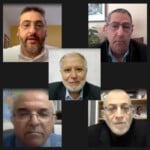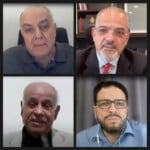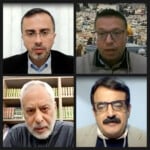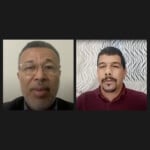In light of the anticipated repercussions of Trump’s victory in the US elections on Middle Eastern developments, and the potential impact of his policies on regional countries and the Palestine issue, al-Zaytouna Centre for Studies and Consultations organized a symposium titled “US Election Results and Their Impact on the Palestine Issue and the Arab World.” Held on 12/11/2024, via Zoom, the symposium featured a select group of specialists, researchers and individuals with an interest in Palestinian political affairs and international issues.
Al-Zaytouna Centre’s General Manager Prof. Dr. Mohsen Mohammad Saleh moderated the symposium featuring four working papers. Dr. Abdelhamid Siyam, an expert in United Nations affairs and a lecturer of Political Science and Middle Eastern Studies, opened the session with his paper, highlighting four major crises facing President Trump. These included the Russian-Ukrainian war, the genocidal war on Gaza Strip (GS), and the broader Middle East war involving Lebanon, Syria, Yemen, Iraq and Iran, all intertwined with the interests of US allies in the Gulf states. The fourth challenge, Siyam noted, is the rise of China, particularly its challenge to US hegemony and the Taiwan crisis, alongside the emergence of new international alliances, such as BRICS+, Shanghai Cooperation Organization, and the G20, pushing for a multilateral global order.
Siyam stated that the Biden administration may attempt in its final days to end the war in Lebanon and possibly GS. If this fails, as expected, Trump would work to stop the war in a way that satisfies Netanyahu. Siyam also predicted that Trump would support Israel’s decision to ban UNRWA, end its role entirely, and halt any funding for it, while reviving the “Deal of the Century” with modifications favoring Israel. Trump might tolerate settlement expansion, allow incursions into al-Aqsa Mosque and potentially cancel the Hashemite custodianship of Christian and Islamic holy sites in Jerusalem. Siyam added that the Palestinian state could be reduced to a fragmented entity, scattered into outposts and ghettos, and that Trump may find Palestinian leaders with security ties to Israel willing to accept this arrangement.
Siyam believes that all previous plans may fail unless there is a strong, unified stance from the three main Arab countries: Saudi Arabia, Egypt and Jordan. He added that Arab countries may align with Israel and the US if Trump successfully brokers a ceasefire in GS and Lebanon and moves toward establishing a Palestinian state. Such developments would facilitate broader normalization efforts, isolate Iran and shift the Gulf region away from the Sino-Russian axis. However, if Trump behaves condescendingly and arrogantly, it will only bolster Iran’s influence, encouraging regional countries to strengthen ties with Iran, Russia and China while playing a more prominent role in BRICS+.
Dr. Osama Abu Irshaid, a researcher at the Arab Centre for Research and Policy Studies, presented the second paper, describing Trump as a transactional narcissist, heavily influenced by those around him. His unpredictability, Abu Irshaid argued, stems from both his personality and his lack of a coherent foreign policy vision. Trump positions himself as a self-appointed rebel against the establishment, aiming to reshape the global landscape, though this ambition is hindered by rivalries, particularly with China, as well as disagreements with Germany, France, NATO and others. Abu Irshaid noted that Trump has effectively purged the Republican Party of opposing statesmen, leaving it molded in his own image. He also emphasized that the president largely drives US foreign policy, given the near-absolute powers of the office.
Abu Irshaid emphasized that in the US, there is increasing discussion about shutting down institutions that voice opposition to Israel, posing a threat to Arab presence and influence. He noted the significant sacrifices and heroic efforts made by the resistance in Palestine and Lebanon but cautioned against overburdening it. He also warned that relying on support from Arab and Muslim governments is an illusion, as these states primarily pursue their own interests.
Abu Irshaid stated that the normalization process initiated by Trump in coordination with Netanyahu—based on normalizing relations with Arab states while isolating the Palestinians—aims to leave Palestinians with no option but to accept imposed terms. He added that Netanyahu’s appointment of an Israeli settler affiliated with the Kahanist group, which is classified as a terrorist organization in the US, as ambassador signals tacit support for annexation, not only in GS but also in the West Bank (WB).
Regarding the reshaping of Palestine and GS, Abu Irshaid stated that we are entering a difficult phase. He emphasized that we should not rely on the role of Massad Boulos, Tiffany Trump’s father-in-law, as he will not act beyond the confines of the biased US policy framework. This is particularly true given the potential for a rebellious, anarchic and ideological movement to influence foreign policy.
The third paper was presented by Prof. Dr. Sami al-Arian, Director of Center for Islam and Global Affairs (CIGA) in Istanbul. He explained that one of the most significant strategic repercussions of Operation al-Aqsa Flood was its impact on the Israeli project aimed at resolving the Palestine issue. It also affected various aspects of Israeli security, intelligence and military operations, as well as its narrative, media, legal standing, immigration and economy. Al-Arian added that Israel views this war as an existential one, with ambitious goals that are difficult to achieve without several key conditions, including actions required from Arab regimes and the US. These goals include restoring deterrence and achieving the total defeat of resistance movements in the region, particularly as the US grants Israel significant freedom to act outside state frameworks while seeking involvement in decisions regarding Iran. These objectives encompass resolving the Palestine issue, using Operation al-Aqsa Flood as an opportunity for demographic change, expelling Palestinians, and pursuing annexation and Judaization. Israel will attempt to negotiate with Trump on these matters, while also leveraging US influence to pressure Iran into an agreement that requires it to surrender all nuclear technology and limit its missile capabilities. Additionally, one goal is to encourage the US to pressure Arab and Muslim countries to normalize relations with Israel.
Al-Arian presented two scenarios regarding the future. The first scenario suggests that Israel aims to establish a new order in the Middle East by eliminating resistance forces and the Axis of Resistance, while regaining its image of strength. This plan may include annexing Area C and providing incentives to the Palestinians to facilitate Saudi normalization. In this context, the Arab position is seen as the greatest weakness. The second scenario posits that the Axis of Resistance has no option but to continue its struggle. If Israel is not worn down by attrition, the imposed settlements will be extremely harsh, not only on Palestinians but on the entire region, leading to catastrophic consequences.
The fourth paper was presented by Prof. Dr. Walid ‘Abd al-Hay, an expert in futures studies, who outlined four key factors in determining the actions of the winning party in the US elections, particularly concerning Arab issues. The first factor is the strategic, rather than tactical, differences in foreign policy between the parties, especially the Democrats and Republicans, on issues such as military intervention, efforts for peace in the Middle East, the use of the Security Council veto, and the stance on Jerusalem. The second factor is the difference between the personalities of the presidents, noting that while the US is an institutionalized state with limits on presidential power, the president can maneuver tactically but not shift the overall strategic direction. The third factor is the international circumstances that will influence presidential behavior. The fourth and final factor is the Arab position, which is a key determinant of US actions.
‘Abd al-Hay stated that if the Arab position remains unchanged, Trump will likely seek to extract maximum benefits from them in areas such as arms sales, trade and investment. He added that Trump might attempt to exploit certain Iranian policies and trends to instill fear in the Arab world, pushing them to rely more on him and purchase weapons. He also noted potential points of conflict between Trump and Iran, including the continuation of sanctions, the nuclear agreement, and the stance on the Axis of Resistance, but emphasized that Trump’s position on these issues depends on the level of Arab support. Additionally, he stressed that the Arab stance plays a key role in shaping Trump’s position on Israel, as his pragmatic approach would prompt him to respond to significant pressure if he perceives the Arab position as impacting his interests and trade.
‘Abd al-Hay concluded that the focus should be on the tools of influence over Trump, rather than on those that Trump has on the Arab position.
The session featured significant interventions and comments from a group of experts and specialists on the presented papers, concluding with the presenters’ responses and clarifications to the discussants’ questions and feedback.
Al-Zaytouna Centre for Studies and Consultations, 13/11/2024








Leave A Comment